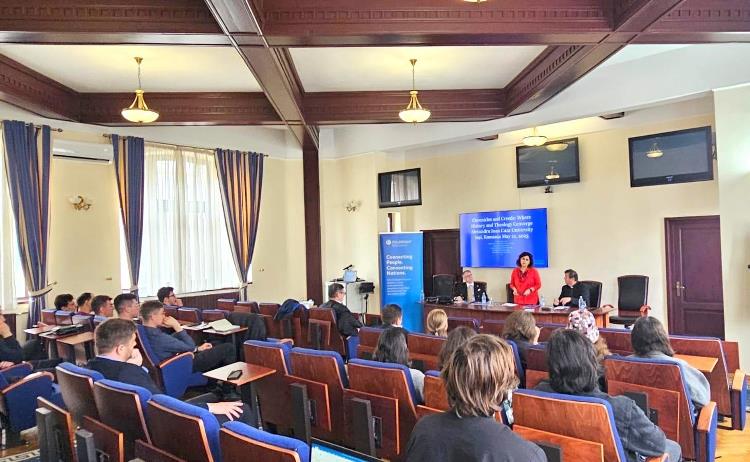Romania took hold of my heart in 2015 and since then has consumed my mind and soul. As with any genuine commitment, my relationship with this beautiful, complex country has grown and deepened over time as I have learned of its many tragedies, as well as its many triumphs. I have surrendered myself to Romania. [...] As I continue my Romanian journey, I marvel over the resiliency and fortitude of the people. I am fortunate to have developed close relationships, familial in many ways, with many Romanians. And I am eternally grateful to have been granted a Fulbright and honored to become part of this amazing community.
Chronicles and Creeds

On May 12, 2025, Dr. Ines Angeli Murzaku—Professor of Religion at Seton Hall University in South Orange, New Jersey, and Fulbright Scholar at Babeș-Bolyai University in Cluj-Napoca—delivered a keynote lecture at “Alexandru Ioan Cuza” University of Iași, entitled “Chronicles and Creeds: Where History and Theology Converge.”
The event was moderated by Dr. Gabriel Leanca, Fulbright Ambassador and Associate Professor at the Faculty of History, and Dr. Lucian Păuleț, Lecturer at the Faculty of Roman-Catholic Theology.
Dr. Murzaku’s presentation explored the dynamic intersection of historical events and theological thought. The animated discussion that ensued led to the following key conclusions:
By studying chronicles and creeds together, students can gain a fuller understanding of both the events of history and the development of beliefs. Interdisciplinary study, as demonstrated, comes with challenges (it requires care and rigor, and institutional support), but the benefits clearly outweigh the costs when done properly. Interdisciplinarity is an essential feature of contemporary scholarship and education. In the specific case of history and theology, we see how deeply intertwined human understanding is – our interpretations of the past are colored by our values, and our theologies are situated in history. Thus, this convergence is not just an academic exercise but key to comprehending culture and identity. Bridging disciplines can indeed rejuvenate humanities. By embracing interdisciplinarity, the humanities can continue to flourish and demonstrate their indispensability in academia and society. As Cardinal Newman, Idea of a University, argued more than a century ago, “all knowledge forms one whole, because its subject-matter is one; for the universe in its length and breadth is so intimately knit together, that we cannot separate off portion from portion, and operation from operation, except by a mental abstraction.”
In 21st-century terms, breaking down disciplinary silos and finding unity in knowledge keeps our collective quest for understanding both dynamic and relevant. The chronicles (history) and creeds (theology), studied together, illustrate just how fruitful cross-disciplinary ventures can be—showing us that neither discipline alone holds all the answers. By bridging the gap between historical context and theological insight, we broaden our capacity to grapple with the questions of meaning, truth, and experience that no single field can fully resolve. In doing so, we prepare future students, scholars, and global citizens to engage with life’s deeper complexities, equipped with a richer, more interconnected vision of the world using chronicles and creeds innovatively.


